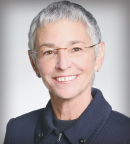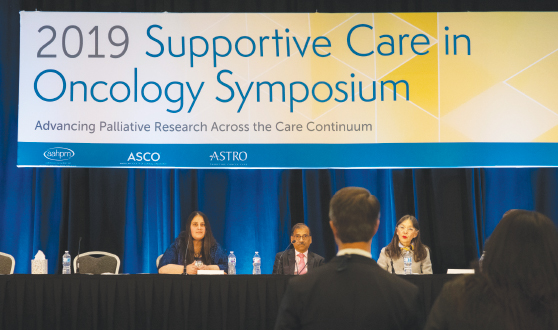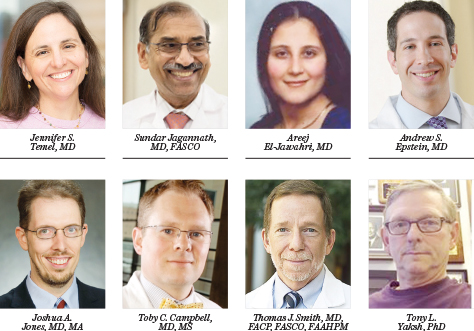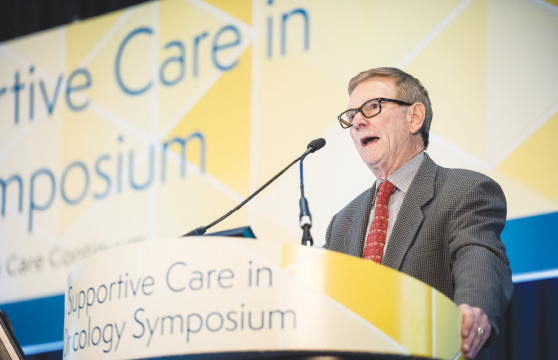The 2019 Supportive Care in Oncology Symposium: Advancing Palliative Research Across the Care Continuum, held this past October in San Francisco, marked the fifth anniversary of its inauguration and its last as a stand-alone ASCO thematic meeting. Since its launch in 2014 as the Palliative Care in Oncology Symposium, the meeting has attracted more than 3,000 attendees and presented over 1,500 study abstracts on an array of the physical and psychosocial symptoms patients with cancer often encounter and the science behind alleviating those symptoms. The meeting also introduced a then-nascent interdisciplinary approach to the treatment of cancer symptoms to improve disease outcome and quality of life for patients. This approach led to the integration of palliative care into usual cancer care for patients at every stage of survivorship.

Jamie H. Von Roenn, MD, FASCO
GUEST EDITOR
Addressing the evolving needs of cancer survivors at various stages of their illness and care, Palliative Care in Oncology is guest edited by Jamie H. Von Roenn, MD, FASCO. Dr. Von Roenn is ASCO’s Vice President of Education, Science, and Professional Development.
“The recognition of the importance of treating the ‘whole patient’ has increased over the past decade,” said Jamie H. Von Roenn, MD, FASCO, ASCO’s Vice President of Education, Science, and Professional Development, and a chief architect of the development of the conference. “Now, our approach to the treatment of cancer is more explicitly in the context of considering not just the disease, but also the patient’s goals and values, comorbidities, environment, and family members. So, the idea of whole-person care is actually supported by the integration of palliative and symptom management into standard oncology care. Many of our therapies result in long-term toxicities that need continuous management and ongoing attention, especially now with so many survivors living with cancer as a chronic disease.”
Integrating Palliative Care Into -Standard Oncology Care
Over the past 5 years, the symposium has fostered innovative research in palliative and supportive care medicine and furthered a more holistic approach to oncology care to address the myriad side effects of cancer and its treatment. These trends have led ASCO to eliminate the meeting from its symposia schedule and instead integrate research findings and best practices in palliative care into sessions presented at the Annual Meeting and other ASCO specialized meetings, to bring advancements in the field of palliative medicine to a wider audience.
“The fact that ASCO launched this symposium demonstrated its recognition of the value of integrating palliative and supportive care approaches into standard oncology care, as well as the value of bringing together the premier clinical investigators in this arena in one place and for the opportunity the meeting presented to network and share ideas,” said Jennifer S. Temel, MD, Professor of Medicine at Harvard Medical School and Clinical Director of Thoracic Oncology and Director of Cancer Outcomes Research at Massachusetts General Hospital, Boston, and recipient of the Walther Cancer Foundation Palliative and Supportive Care in Oncology Endowed Award and Lecture at the 2018 Palliative and Supportive Care in Oncology Symposium. “Data presented at the Palliative and Supportive Care Symposium have translated into changes in clinical care. Making sure that our patients have good symptom control, support for their psychosocial distress, support for their families, and quality care at the end of life is now an essential part of oncology care and should be part of the sessions presented at the Annual Meeting and at ASCO’s thematic meetings throughout the year. I hope this change will be a motivating factor for clinical investigators to continue to push the research agenda and give them an opportunity to present their findings to a broader audience.”
Improving Communication Skills in the Era of Cellular Therapies
As in past years, the research and educational sessions presented at the 2019 Supportive Care in Oncology Symposium showcased the dynamic changes happening in oncology care, including the impact of cellular therapies, such as chimeric antigen receptor (CAR) T-cell therapy, on the fields of palliative care and medical oncology. For example, a session on “Driving Palliative Care Forward Into the Era of CAR T” featured a discussion by Sundar Jagannath, MD, FASCO, Professor of Medicine, Hematology, and Medical Oncology, at Mount Sinai Medical Center, New York, on “The Unusual Toxicities of CAR T-Cell Therapies,” and Areej El-Jawahri, MD, Assistant Professor of Medicine at Massachusetts General Hospital and Instructor in Medicine at Harvard Medical School, on “Navigating Prognostic Uncertainty With Novel Cellular Therapies: So, You’re Saying There’s a Chance?”

Sundar Jagannath, MD, FASCO, Professor of Medicine, Hematology, and Medical Oncology, at Mount Sinai Medical Center (center); Areej El-Jawahri, MD, Assistant Professor of Medicine at Massachusetts General Hospital and Instructor in Medicine at Harvard Medical School (left); and Effie W. Petersdorf, MD, Member of the Clinical Research Division at the Fred Hutchinson Cancer Research Center, answer attendees questions during the session on Driving Palliative Care Forward Into the Era of CAR T at the 2019 Supportive Care in Oncology Symposium.
“This session was a good example of striking a balance between what the science is showing on the effectiveness of new treatments such as CAR T-cell therapy and the difficulty of prognosticating in the era of developing therapeutics,” explained Andrew S. Epstein, MD, Assistant Attending on the Gastrointestinal Medical Oncology and Supportive Care Service at Memorial Sloan Kettering Cancer Center, New York, and Chair of the Program Committee for the 2019 Supportive Care in Oncology Symposium.
New this year was a role-playing session tackling whether oligometastatic disease is curable and how to identify and communicate prognostic factors associated with either improved or poor outcome to patients. The role-playing session, “Approaching Oligometastases: Is Cure Possible With Modern Cancer Therapeutics?” featured Joshua A. Jones, MD, MA, Chief of Palliative Service, Radiation Oncology and Director of Quality Assurance/Quality Improvement in Radiation Oncology at the University of Pennsylvania, Philadelphia, as the patient, and Toby C. Campbell, MD, MS, a thoracic medical oncologist in the Division of Hematology, Medical Oncology and Palliative Care at the University of Wisconsin–Madison School of Medicine and Public Health, as the oncologist, discussing the patient’s prognosis. Dr. Campbell eventually told the patient, “No, I don’t think this disease is going to be cured,” and followed up with assurances that the patient would have ongoing supportive care and would not be abandoned.

“Role playing, whether for education in small private groups or in more public forums like this symposium, is an underused but often effective strategy for both learners and audience members, particularly for the discussion of challenging and sensitive topics, such as communicating serious illnesses like advanced cancer with patients. I hope we were able to show through this session the nuance, sensitivity, and skill that are absolutely necessary when caring for patients with serious illnesses. Just like we meticulously plan surgical procedures to ensure the best outcome, we have to meticulously plan how to improve our communication skills with patients and their families, to ensure that we convey accurate prognostic information compassionately,” said Dr. Epstein.
Treating the Emotional and Physical Aspects of Pain
Perhaps the most moving presentation during the 2019 Supportive Care in Oncology Symposium was the keynote address by Thomas J. Smith, MD, FACP, FASCO, FAAHPM, the Harry J. Duffey Family Professor of Palliative Medicine and Director of Palliative Medicine at Johns Hopkins Medicine, Professor of Oncology at Johns Hopkins University School of Medicine, Baltimore, and the recipient of the 2019 Walther Cancer Foundation Palliative and Supportive Care in Oncology Endowed Award and Lecture.
Dr. Smith’s address, which looked back on his 35-year career in the field of oncology, including his acclaimed work in palliative care, also detailed his recent health challenges, including an aortic aneurysm, advanced prostate cancer, and serious bouts of depression that nearly led to suicide. (See “Coexisting With Cancer and Depression,” in the December 25, 2019, issue of The ASCO Post.)
Research advances in pain management for patients with advanced cancer and the use of medical cannabis to alleviate cancer-related symptoms were also highlighted in this year’s symposium. The keynote address by Tony L. Yaksh, PhD, Professor in Anesthesiology and Pharmacology at the University of California, San Diego, “A Scientist’s Perspective on the Future of Pain Management for Patients With Advanced Cancer,” focused on his research in the biology of pain processing, spinal drug kinetics, and spinal drug safety.
[Cancer-related pain] is a tough nut to crack. It is truly one of the difficult clinical conditions that you have to manage.— Tony L. Yaksh, PhD
Tweet this quote
Cancer-related pain, said Dr. Yaksh, “is a tough nut to crack. It is truly one of the difficult clinical conditions that you have to manage. It’s not only an inflammatory condition. The inflammation can lead to long-term changes in neural function that look very neuropathic. It represents a sensitization of the entire system itself.” Pain, said Dr. Yaksh, is not just a physical experience, it has an emotional component too.
“We thought Dr. Yaksh’s presentation was going to focus on the pathophysiology of pain and the emerging pathophysiology-based treatments for pain, but it broadened into the nonphysical realms of pain and the emotive underpinnings of pain,” said Dr. Epstein. “The critical components and interplay of the mind and emotion with the sensation and reporting of pain were music to my ears. It showed the importance of treating not just patients’ physical pain, but their psychosocial concerns as well, and that’s the definition of palliative care.”

Tony L. Yaksh, PhD, Professor in Anesthesiology and Pharmacology at the University of California, San Diego, delivers the keynote address on “A Scientist’s Perspective on the Future of Pain Management for Patients With Advanced Cancer,” which focused on his research in the biology of pain processing and in spinal drug kinetics and spinal drug safety.
Broadening the Reach of Palliative Care
Incorporating palliative care services, which include symptom management, psychosocial counseling, and discussion about treatment goals, into standard oncology care has long been championed by ASCO. Its decision to provide a larger forum to present scientific research in palliative medicine through the Annual Meeting showcases the increasing need to support patients and their families throughout the trajectory of cancer survivorship, especially as more patients are living with cancer as a chronic disease.
For the past 5 years, we have been speaking to the converted. Now we need to raise the profile of the benefits of palliative care to the greater oncology community to improve care for patients affected by cancer.— Jamie H. Von Roenn, MD, FASCO
Tweet this quote
“Everyone recognizes the need for symptom management at the end of life, but, in fact, patients with a new cancer diagnosis also have very significant physical and psychosocial symptoms that need attention,” said Dr. Von Roenn. “Many of our therapies result in long-term symptoms or toxicities that need continuous management. Also, patients living with treatable but incurable cancer require ongoing attention to all of these issues. What we really want to do with the integration of palliative care research into ASCO’s Annual Meeting, as well as its thematic meetings, is reach the broadest possible audience, because that is how more patients will actually benefit from our increasing knowledge about the importance of palliative and supportive medicine in oncology care. Additionally, ASCO leadership is looking into how we can support researchers investigating niche topics, such as palliative care and survivorship, and develop a networked community to advance this research.”
While the Palliative Care in Oncology Symposium was successful in increasing the understanding of the role of palliative medicine in oncology care, its audience was mostly limited to those involved in the subspecialty. Integrating more study abstracts in palliative medicine into ASCO’s Annual Meeting and other symposia will help close the educational gap on its benefits and generally improve patient care, according to Dr. Von Roenn.

The Palliative Care in Oncology symposium was held in San Francisco.
“For the past 5 years, we have been speaking to the converted. Now we need to raise the profile of the benefits of palliative care to the greater oncology community to improve care for patients affected by cancer. Bringing this research into general oncology education will help accomplish that goal,” said Dr. Von Roenn. ■
DISCLOSURE: Dr. Von Roenn reported no conflicts of interest. Dr. Temel has received institutional research funding from Pfizer. Dr. Epstein receives royalties from Up-To-Date for peer reviewing, GI medical oncology, and palliative care topic reviews. Dr. Yaksh reported no conflicts of interest.

